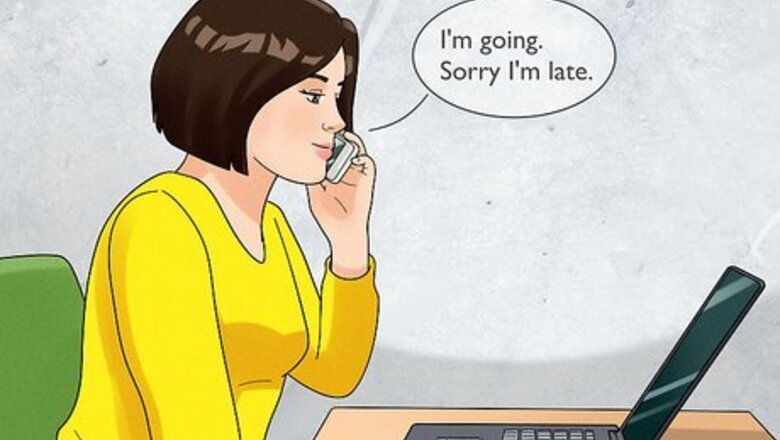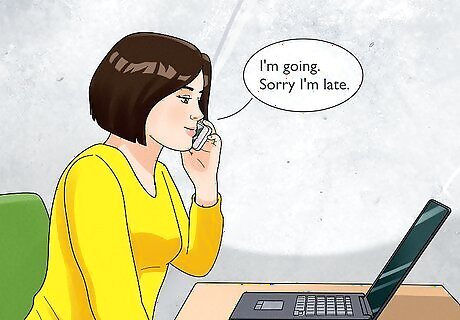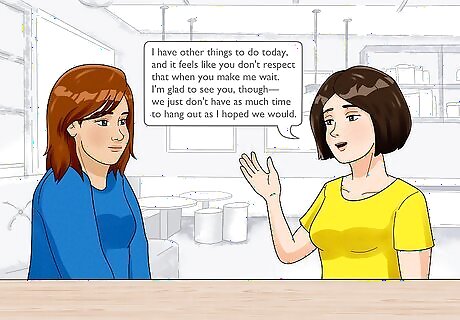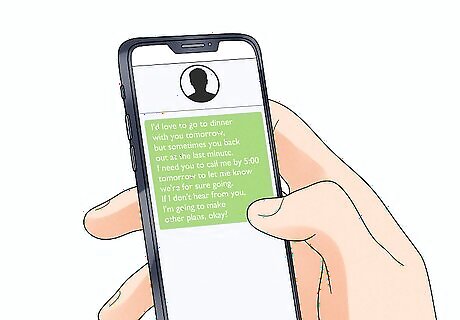
views
Clinical psychologist Dr. Tala Johartchi says to evaluate the friendship to make sure “it's not one sided” or you're not “feeling like your…energy is being sucked up.” If your friend is unreliable, tell them how their behavior affects you and be clear about your boundaries.
Avoid depending too heavily on your friend.

Work around your friend's tendency to flake on you. There's nothing worse than having to cancel or change your plans because of an unreliable friend—so try to avoid putting yourself in that situation. You don't have to necessarily cut the person out of your life entirely, but do try to make sure your day won't be ruined if they don't keep up their end of things. For instance: Don't interrupt what you're doing to wait for your friend if they're always late. Keep watching your movie or folding the laundry, and have them call or text you once they arrive. If your friend promises they'll bake a cake for your daughter's birthday, plan to have cupcakes as well. If your friend does bring a cake, you'll have extra sweets on hand—no big deal! If they don't, though, the party can still go on as planned.
Call out unreliable behavior when it happens.

Don't make a big deal out of it, but do mention it. If your friend says they'll meet you for lunch at 1:00, then they casually stroll into the restaurant around 1:30, you've had a whole half-hour to sit alone with your feelings. You don't have to put on a brave face and pretend everything's okay when they finally get there. If you're upset, don't be afraid to say so. For instance, you might say something like, "I have other things to do today, and it feels like you don't respect that when you make me wait. I'm glad to see you, though—we just don't have as much time to hang out as I hoped we would." If your friend cancels your plans altogether, you might say, “Hey, Carla. You always seem to bow out at the last minute without any explanation. That makes me feel like I’m not a priority as your friend. What’s up with that?”
Point out your friend's reliable behavior, too.

Give them positive feedback when they follow through. If you notice your friend trying really hard to be more reliable, let them know. That might mean keeping plans, being on time, or even just letting you know ahead of time if their plans have changed. When you give them positive encouragement, they may be more likely to work harder at being there for you in the future. For instance, if they call ahead of time to tell you they're running late, you could say, "Thank you so much for giving me a heads up—I know sometimes things come up, and it means a lot that you thought to let me know."
Have a serious conversation if things don't change.

Let them know how their choices affect your friendship. If you feel like your friend just really isn't taking your feelings into consideration, it may help to have a more in-depth conversation with them about what's going on. Use "I" statements to let them know how it makes you feel when they're late or they don't follow through on plans. For instance, you might say, "I feel really frustrated when we make plans and you don't show up and I end up sitting and waiting without even a phone call. It makes me feel like our friendship isn't important to you, and I can't help but take it personally." Take some time to get to the bottom of how you're really feeling before you talk—maybe you feel unappreciated, disrespected, or ignored, for instance. By being open and honest with your friend, you might be able to find out more about what's happening with them, as well.
Be clear with them when you're making plans.

Set boundaries and stick to them. Boundaries are an important part of any relationship. If your friend is often unreliable, it's absolutely okay for you to ask them to commit to concrete plans—and to let them know what will happen if they don't follow through. If you're really specific about what you need, it may help your friend stick to the plan, and they'll already know what to expect if they flake on you. Try saying something like, "I'd love to go to dinner with you tomorrow, but sometimes you back out at the last minute. I need you to call me by 5:00 tomorrow to let me know we're for sure going. If I don't hear from you, I'm going to make other plans, okay?"
Send a reminder before you're supposed to hang out.

Give your friend a quick call or text so they don't forget. If your friend has trouble staying organized, they might not remember that you have plans. If that's an ongoing problem, ask if it would help if you texted them to remind them before you're supposed to meet. If you're supposed to meet for dinner, give them a call around 4:00 and say something like, "Hey are we still on for tonight?" If you don't hear back from them by 5:30 or so, you might consider making other plans.
Make plans to hang out as part of a group.

By hanging out with a group, it won't matter if your friend flakes. If you're planning to spend time together one-on-one and your friend doesn't show up, you might end up having to cancel your plans altogether. When it's possible, try inviting at least one other person to join you so that doesn't happen. This works best when you’re inviting your friend to do things—it might seem rude if they invite you to hang out and you ask if you can bring someone else along.
Find out if there's a problem that's affecting your friend.

Be understanding and work together on a solution. Your friend may already be aware that they're unreliable, but they might not know how to change it. By showing that you care, you may be able to come up with a practical strategy to help overcome this issue. Your friend might be struggling with anxiety, social anxiety, or depression. An issue like that might cause them to feel overwhelmed when it's time to meet up, so they might procrastinate or cancel altogether. If that's the case, you might be able to work together to make plans where they'll feel comfortable and secure.
Try to accept your friend for who they are.

Changing your expectations can help you not be as disappointed. Sometimes, you just have to come to terms with the fact that someone is going to consistently cancel at the last minute, or that they're going to be late any time you make plans. If you tell yourself this ahead of time, you might not feel as frustrated when it happens. This is a good approach when you're dealing with someone who's otherwise a great friend, but maybe they're super busy and have a hard time keeping commitments. It's still okay to set certain boundaries with your friend—like telling them you won't wait more than 20 minutes if you're supposed to meet for dinner. If you have a hard time doing this, try making a list of everything you love about your friend, and read it when you start getting frustrated with them.
Take some time away from your friend if you're really frustrated.

Step back so you're not as dependant on the relationship. Sometimes, you just can't help that it hurts your feelings when a friend flakes on you. If you feel like the situation is causing you more upset than it's worth, it's fine to put a little space between the two of you. You don't even necessarily have to let them know what you're doing—just don't be the one to reach out or try to make plans. If your friend tries to make plans, say something like, "I have a lot going on right now, but I'll get back to you when things ease up."
End the friendship if you feel like it's one-sided.

Make this decision if the situation is really stressing you out. It's really hard to maintain a relationship with someone if you feel like you're the only one putting in any effort. If you've tried talking to them and the other person still isn't showing signs of respecting your time, you might be better off cutting ties with them altogether. This can be really hard sometimes, but in the long run, you might find that it leaves you more room for healthy friendships that leave you feeling refreshed instead of exhausted. Sometimes people use flakiness as a passive-aggressive way of telling you they don't want to be your friend. If they continually overstep your boundaries, ask yourself if they're really that good of a friend after all. It might be time to end the relationship if your friend regularly cancels plans without calling, doesn't follow through on important promises, or makes you feel like you're overreacting when you talk about how you feel.




















Comments
0 comment